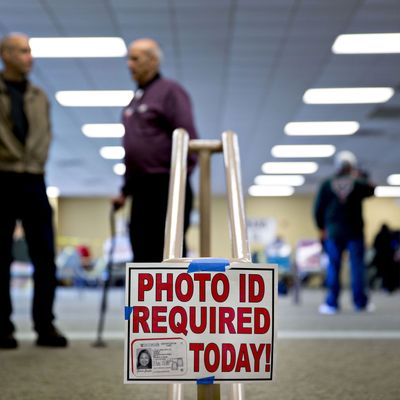
A new study found that 11.2 percent of voters in two counties were discouraged from voting in the 2016 election because of restrictive voter-ID laws.
The research, conducted by two political-science professors at the University of Wisconsin, is the latest indicator that such laws, championed by Republican governors and state legislatures across the country, have succeeded in preventing poor and black voters from turning out at the polls.
The study surveyed 288 people in heavily populated Dane and Milwaukee counties who had been on the voting rolls as of the 2016 election, and found that 6 percent cited a lack of identification — which under Wisconsin law entails a driver’s license, passport, naturalization, or more-obscure documents — as the reason they did not vote. Many of the people surveyed did actually possess proper ID, but thought the law would bar them from voting anyway, and did not bother to cast a ballot.
In total, the 11.2 percent figure corresponds to 16,801 people in the two surveyed counties, though the study notes that, given the confidence level of the prediction, the number could be as high as 23,252. Kenneth R. Mayer, one of the study’s co-authors, said, “The 11.2% figure is actually a lower bound since it does not include people who don’t even register because they lack an ID.” In 2016, the percentage of people casting ballots ticked down in Wisconsin to the lowest level since 2000, and Hillary Clinton lost the state by just 22,748 votes. The study found that 80 percent of those who didn’t vote did cast a ballot in 2012.
The study also found that people dissuaded by the laws tended to be poor and/or black:
The burdens of voter ID fell disproportionately on low-income and minority populations. Among low-income registrants (household income under $25,000), 21.1% were deterred, compared to 7.2% for those over $25,000. Among high-income registrants (over $100,000 household income), 2.7% were deterred. 8.3% of white registrants were deterred, compared to 27.5% of African Americans.
For a variety of reasons, it’s difficult to assess exactly why people didn’t vote, and at least one political scientist urged people not to draw overly broad conclusions from one small study.
Earlier claims that hundreds of thousands of people didn’t vote in Wisconsin because of the voter-ID laws were met with strong and convincing rebuttals. And it’s certain that the decrease in black turnout in Wisconsin was due at least in part to the candidates on offer, not the new laws.
Still, the study is an important piece of evidence that Republicans’ plan to make it more difficult to vote is working. Since the 2010 wave elections, Republicans have enacted dozens of voter-ID laws around the country, ostensibly to battle the almost nonexistent scourge of voter fraud. The barely concealed motive for the laws, and for other anti-democratic measures like limiting early voting, is to hinder poor people and minorities from casting ballots.
The Trump administration has enthusiastically embraced this insidious trend. It has assembled a “Voter Fraud Commission” whose purported aim is to maintain the “integrity” of elections, but whose real mission is to nationalize the state-level attack on democratic representation, and justify President Trump’s risible claim that he actually won the popular vote last year.






























